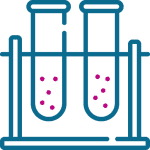Alkaline phosphatase
It is an indicator of bone and liver pathology. Important to note: sometimes an increase in this enzyme can be due to the patient’s blood being tested after a meal.
6,00 €

Alkaline phosphatase (ALP) is an enzyme produced by the liver, kidneys, lungs, uterus, intestines and bones. Serum alkaline phosphatase activity is the most common sign of liver and kidney dysfunction – bile leakage and inflammation, stones, cysts, cirrhosis, metastatic liver tumours or primary liver cancer. Increases in alkaline phosphatase activity are closely linked to bone processes such as Peget’s disease, bone sarcoma, cancer metastasis, osteoporosis, etc. Alkaline phosphatase activity may be reduced due to anaemia and deficiencies of certain vitamins and trace elements.
Alkaline phosphatase (ALP) is a screening test that is usually used to check or monitor liver and bone disorders. Alkaline phosphatase is part of laboratory test kits, ordered along with other tests to assess liver function or if the patient is suspected of having bone damage.
Elevated levels of alkaline phosphatase mean that the bones or liver are damaged. If other liver tests such as bilirubin, aspartate aminotransferase (AST) or alanine aminotransferase (ALT) are also elevated, liver damage is suspected. If the calcium and phosphate tests are abnormal, it is suspected that the increase in alkaline phosphatase is due to bone pathologies.
Pregnancy can also increase alkaline phosphatase levels. Children have higher levels of alkaline phosphatase as their bones grow, and EF is often very elevated during periods of intense growth (‘growth spurts’). In some people, food can also increase HF levels (usually after a few hours). It is therefore recommended that the test is carried out on a fasting basis. Some drugs (which are rare) can increase HF levels – phenobarbital, phenytoin or carbamazepine, etc.
Occasionally, a decrease in alkaline phosphatase may be detected. Possible causes:
- Poor nutrition leading to deficiencies of vitamin B6, folic acid, vitamin C, phosphorus and zinc;
- Hypothyroidism and parathyroid deficiency;
- Vitamin B12 deficiency;
- Aplastic anaemia;
- Wilson’s disease (a disorder of copper metabolism);
- Other reasons.
You can consult our family doctors.
